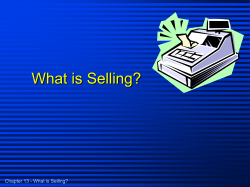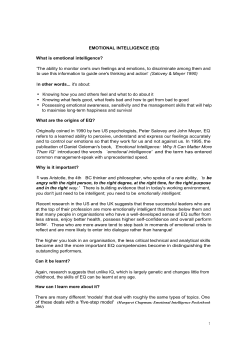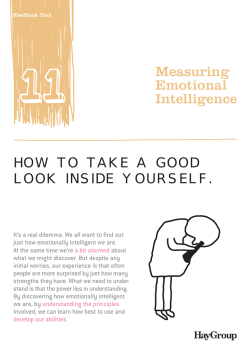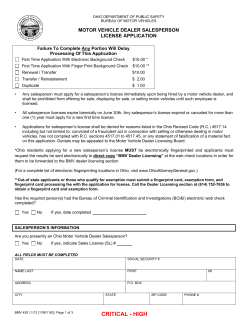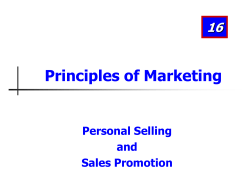
Emotional Intelligence: Why it matters in sales Page 1 of 3
Dealer Magazine: Emotional Intelligence: Why it matters in sales Tuesday, May 16, 2006 Page 1 of 3 Issue 20 VO Emotional Intelligence: Why it matters in sales By Mike Poskey One of the mysteries of the auto dealership world is why general managers and general sales managers assume that low productivity and the resulting high turnover are inevitable with their sales teams. Research has shown it is appropriate to apply the Pareto principle to salespeople whereby 20 percent of all salespeople now make 80 percent of all sales. That means 80 percent of the sales force fights over the remaining 20 percent of the business not produced by the top sales pros. With so many salespeople competing for shares of such a small pie, the turnover rate in sales is obviously very high. But many auto dealer executives are willing to accept, as a cost of doing business, the unending expenses of recruiting, selecting, and training the continuing flow of newcomers into the sales rank. Is a return to percent financing inevitable? They should, instead, recognize that the poor sales productivity and high turnover rampant in the industry are the result of faulty hiring practices. Research has shown that 80 percent of the essential competencies required for success in the workplace are emotional intelligence, which is far greater than IQ or personality traits. Yes No Would 0 percent financing be enough to swa fuel-conscious customers? Emotional intelligence (EI) has been a “buzzword” in the business world for the last several years. By definition, EI is an individual’s ability to recognize and regulate emotions in themselves and others. In practical application it is one’s ability to understand how our emotions and the emotions of others impact action and performance. EI has no greater application than in a sales position. I think so A recent study by the Hay/McBer firm in Boston of Fortune 500 companies including AT&T, IBM, and PepsiCo found that the top 10 percent of the sales forces in the companies surveyed totaled nearly $6.7 million in sales while the norm was only $3 million—more than two times the average or additional sales totaling 88 times the average salary of $42,000. The top 10 percent of those sales forces were very strong in EI competencies while the average salesperson was not. In an objective study of more than 2,000 auto dealer salespeople designed to measure the EI competencies among those salespeople that were successful vs. those that were unsuccessful, the following five competencies were the most critical to predicting sales success and retention in the industry. Intuition & Empathy. This is the salesperson’s awareness of the prospect’s feelings, needs, and concerns. This competency is important in a sales role for the following reasons. z z I'm not su Absolutely Submit * See Survey Results Next Week Attitude toward others: one’s ability to look positively and objectively upon others Understanding others: an intuitive sense of a prospect’s and/or customer’s feelings and perspectives http://www.imakenews.com/dealercomm1/e_article000580258.cfm?x=b7l9nW3,b52Fj7mP 5/16/2006 Dealer Magazine: Emotional Intelligence: Why it matters in sales Page 2 of 3 and showing an active interest in their needs z Customer service orientation: the ability to anticipate, recognize, and meet customers’ needs Results Orientation & Decisiveness. This is the salesperson’s adeptness at inducing desirable responses from the customer or prospect. Communication: sending clear and convincing messages that are understood by the customer or prospect z Influencing: using effective tactics and techniques for persuasion and desired results z Gaining commitment: one’s ability to develop a motivation act Self View. This is the salesperson’s level of courage and self-esteem that provides thick enough skin to persevere through various obstacles they encounter throughout the sales cycle. This competency is important in a sales role for the following reasons z Handling rejection: one’s ability to handle a no or a nonsale and to not take it personally and be able to recover and restart quickly to try again z Self-esteem: the higher the self-esteem the more passion and courage the salesperson will have in the social arena Self Awareness. This is knowing one’s internal states, preferences, resources, strengths, and limitations. This competency is important in a sales role for the following reasons. z Self-confidence: one’s ability to believe in their own abilities and strengths to personally take charge in achieving and exceeding their goals z Persuasiveness: one’s ability to stand their ground in negotiations and in handling sales objections to exude to the customer or prospect that their product or service meets their needs z Competitiveness: one’s desire to win and be perceived as competent in the eyes of others, as well as desire to be personally recognized for their accomplishments Self Expectations. This is the salesperson’s emotional tendencies that guide or facilitate reaching goals and their sense of personal commitment to responsibilities. This competency is important in a sales role for the following reasons. z Achievement drive. striving to improve or meet a standard of excellence we impose on ourselves z Initiative: readiness to act on opportunities without having to be told z Optimism: persistence in pursuing goals despite obstacles and setbacks These are all essential competencies in selling in the auto dealership industry. The salesperson who knows the product or service inside out will not succeed in the long term without possessing these essential competencies. z SUBSCRIBE Email Address: First Name: Last Name: Title: “Since we implemented an emotional intelligence pre-employment profile to help in our sales selection process, our retention has jumped from 10 percent to 77 percent. And not only do the employees stay longer, but they are more productive, catch on more quickly, and require less time in training,” says Regina Roat, HR Director of Sterling-McCall Auto Group in Houston, Texas, which is part of Group 1 Automotive. Auto dealers who are forward thinking and realize they are competing for top talent with other companies in their market are now implementing emotional intelligence into their selection process. Company: State: Postal Code: Additionally, they are also providing emotional intelligence management development programs to assist their managers in leadership development, which has a major impact on improving the manager/employee relationship and is a critical piece to improving employee retention. Mike Poskey is Vice President of ZERORISK HR, Inc., a Dallas-based human resources consulting firm that focuses on developing hiring and retention programs for the auto dealer industry. For more information, visit www.ZERORISKHR.com or e-mail Mike at Submit ARCHIVE Issue 19 May 2, 2006 http://www.imakenews.com/dealercomm1/e_article000580258.cfm?x=b7l9nW3,b52Fj7mP 5/16/2006 Dealer Magazine: Emotional Intelligence: Why it matters in sales Mike.P@ZERORISKHR.com. [PRINTER FRIENDLY VERSION] Page 3 of 3 Vol. 1 Issue 19 Issue 18 April 25, 2006 Vol. 1 Issue 18 Issue 17 April 18, 2006 Vol. 1 Issue 17 [MORE] Powered by IMN™ http://www.imakenews.com/dealercomm1/e_article000580258.cfm?x=b7l9nW3,b52Fj7mP 5/16/2006
© Copyright 2025

